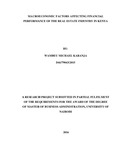| dc.description.abstract | Real estate sales growth is an ideal indicator of anticipated demand for real estate; it is
also a good barometer of the state of economy. Due to the influence of macro-economic
indicators on one another that are occasionally highly correlated, any marginal change in
in one factor causes a ripple effect on the entire market and the effect on the economy is
much more including the REIT industry. The study was underpinned by the behavioral
theory of finance, the Efficient Market Hypothesis (EMH) theory and the Modern
Portfolio Theory (MPT). The question that this study sought to answer was: do
macroeconomic factors have an effect on the financial performance of the REIT industry?
And the objective was to investigate the effect of macroeconomic variables on the
financial performance of real estate industry in Kenya. The study was also longitudinal
in nature. According to Farrington (2016), a longitudinal design is better for
determination of cause-effect relationship. The target population was all the real estate
firms in Kenya. Secondary data was collected from the KNBS, CBK, the NSE and Hass
consult Property Index. Data analyses comprised numeric measures. Essentially, the
study design entailed descriptive statistics. Multiple linear regression models was used by
use of SPSS version 22. From the study findings, real estate sales growth rate had
fluctuated with the highest peak in the third quarter of the year 2012 while the lowest rate
was recorded in the fourth quarter of the year 2013. The study also established that each
of the explanatory variables fluctuated over the study period. The study also established a
positive correlation between real estate sales growth and each of the internal macroeconomic
variables. However, none of the independent variables was statistically
significant individually as shown by their corresponding p-values which were each
greater than 0.05. The study concludes that there is a strong positive relationship between
the macro-economic variables and financial performance of the real estate industry. The
study, therefore, recommends that the CMA, the CBK and other agencies charged with
the responsibility of regulation should plan in advance and influence the macro-economic
variables in the right direction. The study had some limitations: contextual,
methodological and human. These limitations have formed part of the basis for
suggestions for further study. Among the suggestions is that further study should be
triangulated in terms of data sources to mitigate the weaknesses of secondary data that
was used exclusively in this study. | en_US |



